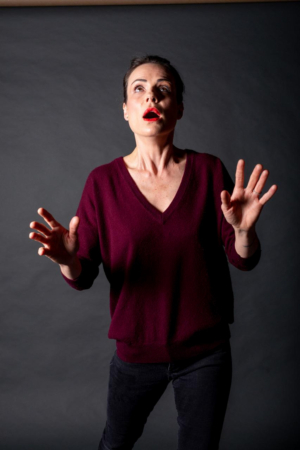Interview: Lilly Bright Talks Bulimia and How Her One Woman Play Sets Her Free

Actress Lilly Bright is about to open in her one woman show American Standard at Highways in Santa Monica. The play reveals a deep secret she has kept about her struggles with bulimia. In our conversation she opens up to our readers and conveys the importance of coming to terms with your inner self. The truth will set you free.
Lilly, you are from West Virginia. Tell our readers about your upbringing and what caused you to initially not feel satisfaction with your life. Was is it your parents? Were they too strict?
Come to my show and find out! Seriously. The family dynamics underpinning the story are layered and complex. Beneath the subject matter of eating disorders and addictions, the show is about family dynamics, secrets and discovering what's at the root of inner and generational pain.
Obviously you became increasingly dissatisfied. What did you do to feel better?
Everything! I'm a seeker. I knew I wouldn't be satisfied with partial recovery. I wanted full transformation which I embody and bring to the stage. This is what makes the solo show genre so powerful. When at its best, the audience bears witness to the transformative journey.
When did you realize that you were in trouble? What advice did you seek?
I'm 17. I'm spending that summer atop the highest mountain in West Virginia in a writing program I was accepted into as an upcoming high school senior. I had to write an autobiographical thesis. This is when I realized I had to tell someone. I couldn't keep my struggle a secret any longer. I admitted I needed help and that began a journey of recovery that lasted ten years.
Talk about what you learned about the perils of bulimia. How do you bring all of this into your show with humor? Give us a couple of examples without creating a spoiler alert.
It's not about the food. People who have never struggled with an eating disorder might find this hard to believe. It took me decades to realize this! It's crystal clear now, but I had to reprogram myself. I had to learn to be with discomfort. To feel feelings without running away.
I'm able to bring humor because I'm fully recovered and I don't take myself or my colorful journey seriously. I'm able to laugh at myself. When tragedy is written and performed well, it is, it CAN be funny. I hope that gets translated. People will laugh and cry.
Is American Standard the first play you have written? How did audiences react to it when you first presented it?
It's the first play I've written that's being staged in this way. I wrote many plays as a child. Our neighborhood would put on the shows. I wrote a play script last fall for a dance company in San Francisco. I performed along with the company and did a spoken word Laurie Anderson type thing. I have been in the film business since 2003 as a producer and distributor. I love being back in the theater; my roots are in dance and theaterical plays.
What is the message of your play? Why is it so important to you to get it out to the world?
Self-love and inner transformation are possible when we learn to embrace all of ourselves, when we learn to stop being so afraid, running away from feelings.
Our planet is going through an incredibly tumultuous time right now. To make a difference and contribute in a meaningful way to society means looking at ourselves first, cleaning up all the places we've been blind to in order to bring that change into the world and have it effect the world positively. I mean, who doesn't want to feel better within themselves and who wouldn't want to share that learning with the world?
Talk about your director Valerie Hager and how she has helped you get the project on stage.
Valerie is a soul-sister, a total professional, a fierce director, visionary and team player. I am so honored to have her alongside me for this show. We have a lot in common, which is contributing to going very deep with the material and makes a perfect collaboration.
There are many one person shows about addiction. What do you feel sets yours apart from all the others? Why should we pick yours to go see?
I'm not aware of another solo show specifically about bulimia. I am aware that a play was recently staged in NYC that addressed anorexia. I'm super pleased to see these topics entering the conversation within the arts community with less and less stigma and shame and with higher and higher levels of quality production. Bulimia is something my character has to deal with as a way of growing up, as a way of becoming comfortable in her own skin. So many of us cling to unhealthy agents in our best efforts to thrive, even though they're not working. I don't make the show solely about bulimia. The scope is much wider and that's why it will appeal to a wide audience range. If my healing wasn't complete I wouldn't be able to make it relatable (and fun!), but I am, and it is.
Highways Performance Space is located at the 18th Street Arts Center (1651 18th Street, Santa Monica, CA 90404). Tickets are $25 for general admission and $15 for students. For more information and tickets, please visit http://americanstandardshow.com.
Performances:
Thu. Sep. 19 - Sat. Sep. 28
• Thursday, September 19 @ 8:30pm• Friday, September 20 @ 8:30pm
• Saturday, September 21 @ 2:00pm
• Monday, September 23 @ 8:30pm
• Friday, September 27 @ 8:30pm• Saturday, September 28 @ 8:30pm
(photo credit: Cheryl Mann)
Videos
